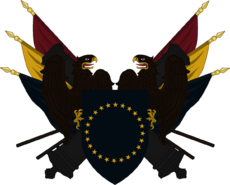Constitution of Carloso: Difference between revisions
(Created page with "{{wip}} {{Infobox document | document_name = Constitution of the Federal Republic of Carloso<br>''Constitución de la República Federal de Cárloso'' | image...") |
No edit summary |
||
| Line 25: | Line 25: | ||
The Constitution created a system of representative democracy in Carloso, inherited from the previous constitution, but established Carloso for the first time as a federation of administrative provinces rather then a unitary state. While generally categorised as a federal republic, Carloso under the 1956 constitution is often referred to as a 'quasi-federal' or a 'unitary state with a federal spirit', due to the limited powers delegated to the provinces and the supremacy of the central government. | The Constitution created a system of representative democracy in Carloso, inherited from the previous constitution, but established Carloso for the first time as a federation of administrative provinces rather then a unitary state. While generally categorised as a federal republic, Carloso under the 1956 constitution is often referred to as a 'quasi-federal' or a 'unitary state with a federal spirit', due to the limited powers delegated to the provinces and the supremacy of the central government. | ||
==Background== | |||
==History== | |||
==Main provisions== | |||
==Original text== | |||
==Amendments== | |||
==Judicial review== | |||
==Controversies== | |||
===English versus Spanish texts=== | |||
===Issue of state religion=== | |||
While the preamble of the Constitution heavily refers to both the {{wpl|Trinity|Holy Trinity}} and the Lord {{wpl|Jesus|Jesus Christ}}, the Federal Republic of Carloso was established as a ''de jure'' secular state. | |||
===Right to life of the unborn=== | |||
===Same-sex marriage=== | |||
==Influence outside Carloso== | |||
[[Category:Carloso]] | [[Category:Carloso]] | ||
Revision as of 02:09, 10 March 2019
This article is incomplete because it is pending further input from participants, or it is a work-in-progress by one author. Please comment on this article's talk page to share your input, comments and questions. Note: To contribute to this article, you may need to seek help from the author(s) of this page. |
| Constitution of the Federal Republic of Carloso Constitución de la República Federal de Cárloso | |
|---|---|
 | |
| Date effective | 20 June 1956 |
| Author(s) | Emmanuel Sartega |
| Purpose | To replace the Constitution of the Republic of Carloso |
The Constitution of the Federal Republic of Carloso (Spanish: Constitución de la República Federal de Cárloso), commonly referred to simply as the Constitution of Carloso or the 1956 constitution is the fundamental law of Carloso. While it is widely regarded to fall within the tradition of liberal Western democracy, recent amendments have been referred to as illiberal by some commentators.
The Constitution created a system of representative democracy in Carloso, inherited from the previous constitution, but established Carloso for the first time as a federation of administrative provinces rather then a unitary state. While generally categorised as a federal republic, Carloso under the 1956 constitution is often referred to as a 'quasi-federal' or a 'unitary state with a federal spirit', due to the limited powers delegated to the provinces and the supremacy of the central government.
Background
History
Main provisions
Original text
Amendments
Judicial review
Controversies
English versus Spanish texts
Issue of state religion
While the preamble of the Constitution heavily refers to both the Holy Trinity and the Lord Jesus Christ, the Federal Republic of Carloso was established as a de jure secular state.